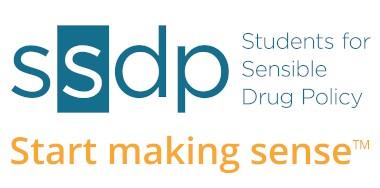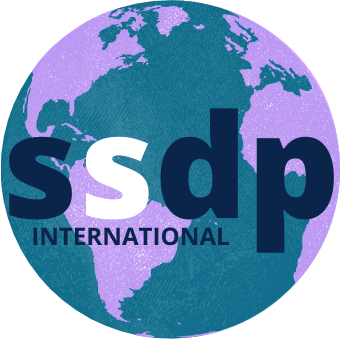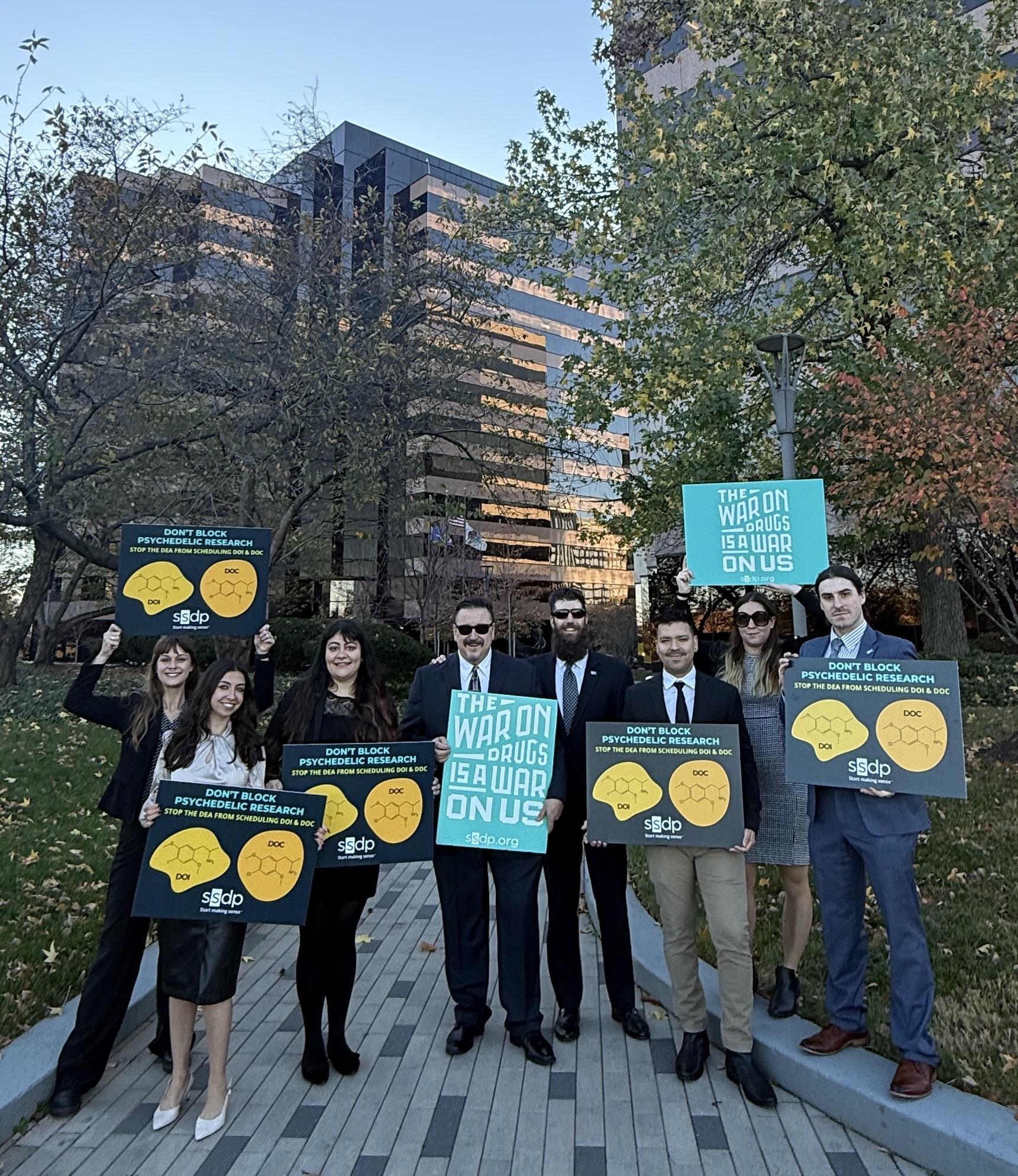This morning in front of the Drug Enforcement Administration (DEA) Headquarters in Arlington, Virginia, SSDP’s Science Policy Committee, a group of PhD students and other researchers who are fighting back against the War on Drugs, along with SSDP’s legal team spoke about our unprecedented court hearing kicking off today and running through November 25.
You can watch the press conference via our Instagram here.
SSDP stands firm in our efforts to stop the DEA from scheduling DOI and DOC, two important psychedelic research chemicals. The future of psychedelics rests in our hands.
Support the fight to keep DOI and DOC legal by donating to SSDP to support our legal efforts here.
SSDP Press Conference Statements from 11/12/2024
DEA Headquarters, Arlington, Virginia
Kat Murti
Executive Director, Students for Sensible Drug Policy (SSDP)
Good morning, and thank you all for joining us in front of the DEA Headquarters in Arlington, Virginia today, as well as to those of you who are watching online.
My name is Kat Murti and I am proud to be executive director of Students for Sensible Drug Policy or SSDP, the largest nationwide network of young people working to replace the disastrous War on Drugs with policies rooted in evidence, compassion, and human rights—policies that make sense.
Today marks a historic occasion: It is the culmination of a multi-year effort on the part of SSDP’s Science Policy Committee—a group of PhD students and other researchers who are fighting back against the War on Drugs with SSDP—to keep DOI and DOC legal.
DOI and DOC are two crucial medical tools that have been used safely in laboratories for decades. Together, they have featured in more than 900 research articles and show promise for pain management, combatting anxiety and depression, preventing overdose, and treating substance abuse disorder.
It is because they are not scheduled substances that they have become the de facto agents for understanding how serotonin works in the brain.
They are not used recreationally. There have been zero arrests for DOI or DOC in at least the last five years. And, there is no evidence that either substance is being diverted out of labs.
And yet, the DEA wants to add DOI and DOC to Schedule I of the Controlled Substances Act, which defines Schedule I drugs as those with a high potential for abuse and no currently accepted medical use.
Doing so would essentially push medical research and public health into the dark ages. It would shut down potentially life-saving research, it would delay continuation of that research for years while making it cost-prohibitive and overly complicated to continue, and it would destroy the careers of the young scientists and academics who have dedicated their lives to finding cures for some of the most pressing mental health and physical illnesses Americans suffer from today.
And yet SSDP is the only drug policy organization currently fighting to keep DOI and DOC off the Controlled Substances Act.
In just a few minutes we will be going into a DEA Administrative Court for the start of a ten-day public hearing that will determine the future of health and of academic integrity in America.
The scientists, policy advocates, and attorneys gathered behind me have worked tirelessly over the last three years to advocate for sensible drug policy and ensure that potential treatments can reach those in need without undue government interference.
DOI and DOC could lead to significant breakthroughs in treating some of today’s most challenging health issues, but this is not just about keeping two chemical compounds available for research; it’s about preserving the integrity of scientific inquiry, advancing medical treatment, and ultimately, impacting lives positively.
The War on Drugs is a war on science. It is a war on medical research and public health. And, the War on Drugs is a War on Us. The DEA’s current path is a disservice to science, health, and the principles of justice and compassion. Keep research legal. Do not schedule DOI and DOC. Thank you!
Brett Phelps
Phelps Law Office
SSDP General Counsel
As the legal representative for Students for Sensible Drug Policy, I’m proud to advocate on behalf of our Science Policy Council. It is an honor to fight for the work of our talented researchers against the overreach of the DEA. The DEA’s arguments for scheduling DOI and DOC are not based in science or reality. Rather, they are an attempt to block critical research that has shown great promise in addressing issues such as drug addiction, PTSD, and chronic pain. We know that the science is on our side, and we look forward to presenting that evidence. Thank you to everyone who has supported us through this journey, thank you to SSDP for empowering young people to speak truth to power, and especially thank you to the researchers who are studying these chemicals to help make this world a better place for all of us.
Robert Rush, Esq.
My name is Robert Rush, and I am here representing the petitioners in this critical matter concerning the future of scientific research in our country – not only research into psychedelics as medicines but scientific research in general. Today, we are here to ask the DEA to respect the true intent of Congress, to protect the advancement of science, and to recognize that placing DOI in Schedule I is not only unnecessary—it is fundamentally wrong and unethical.
Under a legal doctrine known as Chevron deference, the decisions of the DEA as an administrative agency were nearly impossible to challenge, as courts were primarily required to defer to an Agency’s decision. Courts have held that the DEA acted in direct contravention of Congress’ intent but were helpless to stop the DEA due to Chevron, but the Supreme Court this summer overturned Chevron. The DEA no longer has free reign to do as they please with zero accountability. The legal insulation to ignore the will of Congress and the people of the United States is gone. Accountability and transparency are fundamental to the rule of law.
When Congress enacted the Controlled Substances Act, they made something clear: research should not be unduly restricted by scheduling. They knew that to develop new treatments, scientists must be able to study and work with a wide range of substances. For over three decades, DOI has been one of those essential tools—contributing to potential therapies for mental health, chronic pain, and depression, as well as advancing humanity’s understanding of how these critical systems in the human body work. So today, we are here asking the DEA to follow the intent of Congress, to protect scientific discovery, and to avoid taking a step that would hold back the future of medicine and mental health treatment. We are also asking the Tribunal to hold the DEA accountable if they fail to do so. Adding DOI to Schedule I will not protect the public health of Americans. It will do the very opposite. Treatments Americans so desperately need for a multitude of conditions will never be developed if this pointless and perplexing action by the DEA succeeds. Let us keep DOI accessible to researchers working to improve and save lives. Thank you.
Alaina M. Jaster, PhD
Postdoctoral Scholar, Psychiatric and Behavioral Neuroscience
Wayne State University
Today marks the beginning of an unprecedented hearing, as scientists and researchers, such as myself, fight to keep psychedelics DOI and DOC unscheduled in the U.S. As a neuropharmacologist with ten years of research experience surrounding psychedelics and mental health, I am proud to be co-leading our efforts on this challenge through the SSDP Science Policy Council. I have spent the last five years specifically using DOI in my dissertation work, in which I have been able to characterize it pharmacologically and behaviorally and use it as a tool to probe potential treatment mechanisms for opioid use disorder. The work myself and others have done using these compounds suggest they have utility in being developed for medications to treat anxiety, substance use disorders, inflammation and more.
Putting DOI and DOC in Schedule I will halt vital research that could improve the health of people suffering from various disorders. We are working to preserve access to these compounds to ensure these important research avenues are not jeopardized.
Elijah Z. Ullman, PhD
Emory University | Department of Pharmacology and Chemical Biology
SSDP Science Policy Council Chair
We’re standing here today as scientists who study neuroscience and pharmacology to understand how the brain works and to support the development of therapeutic drugs.
DOI has been an essential compound for the last five decades. It helps us understand how a protein in the brain called the serotonin 2 receptor regulates brain activity, is involved in learning and memory, mood, and how the brain’s different regions communicate with one another.
One of the major reasons for its widespread utility and importance is because it is so specific for those serotonin 2 receptors, which helps us ask what this particular class of proteins does. The DEA alleges this compound, because of its activity at these serotonin 2 receptors has a high potential for abuse and is a threat to public health. We will show this conclusion is misguided and without any merit. Scientists have been using it for five decades, and the DEA themselves state there is no evidence of diversion from labs like ours. No one has ever died from DOI, and law enforcement encounters over the last 20 years are less than FIFTY nationwide. So, over 20 years, the police have not even found it once per each state in the country. Common sense says this is not a public health threat, especially given its scientific utility over 50 years.
We hope our work in the coming weeks and over the past year serve as a reference to any scientist looking to engage in scientific policy at the Executive Branch level. We have demonstrated that students can use their expertise to influence policy. Students for Sensible Drug Policy is the home for all student scientists looking to use their expertise at the federal and local levels. We are enthusiastic about empowering the next generation of student leaders and scientists to enhance evidence-based policy for all fields of science.
Placing DOI and DOC in Schedule 1 of the controlled substances act will substantially hinder neuroscience research. Theres promising lines of research as a potential treatment for asthma or inflammation as well. Without these compounds, Americans will suffer because we’ve lost our essential tool to figure out how a critical component of the brain, the serotonin 2 receptor, works.
Dr. Raul A. Ramos
Neuroscience Ph.D.
Miller Research Fellow
HHMI Hanna Gray Fellow
Bautista/Lumpkin Labs
University of California, Berkeley
Good Morning, My name is Dr. Raul A Ramos and today I would like to tell a story. In 2022, I was awarded a 3-year research grant totaling a quarter of a million dollars to study MDMA at UC Berkeley. But, because MDMA is a Schedule I drug, I would need to get a Schedule I license. If I were lucky, the process of getting this license would take about 1 year, 1 third of the funding period. This unfortunate administrative reality was not a situation that would allow me to successfully accomplish the goals of my research. It was a barrier to my science.
Fortunately, the grant had some breathing room for me to pivot and I did. I changed my research plan to study the psychedelic DOI, which was not a Schedule I substance. This made DOI an ideal research tool.
Working with DOI, I quickly began to generate lots of interesting data, and I used this data as the premise for a second, much larger grant. The results I found were promising, and so I was awarded 1.5 million dollars in funding distributed over 8 years for me to continue my work.However, now I find my career, my goals and my science coming to crash again the same barrier that derailed me 2 years ago. Scheduling of substances is a barrier to scientific research and an obstacle to progress. It prevents us from deepening our understanding and as the system currently stands, it can serve no good. Scheduling does not prevent people from recreationally consuming psychedelics, but it does raise very real walls that prevent us from understanding the biology of these drugs.
It’s time to let science lead the way and tear down the barriers that hold back progress. Only by removing these obstacles can we make way for groundbreaking advancements in science and medicine. Together, my colleagues and I are here to champion a future where science is not hindered by unnecessary barriers but empowered to explore and innovate. Thank you.
Gina Giorgio
SSDP, Director of Strategy and Development
Thank you all for being here today as we prepare to step into this pivotal hearing. My name is Gina Giorgio and I am the Director of Strategy and Development at SSDP.
As we’ve heard, placing DOI and DOC on Schedule I would significantly hinder groundbreaking research with the potential to transform mental health care. The voices you’ve heard today are those of researchers, experts, and advocates who see the immense value these compounds hold for science and public health. By restricting access, the DEA risks stalling progress in psychiatry and neuroscience and undercutting the work of dedicated scientists who’ve committed their careers to better understanding the human mind.
That is why this moment is a testament to the power of students and activists—the power to drive change, to challenge systems, and to stand up for science and truth. This hearing isn’t just about DOI and DOC; it’s about our commitment to a future where research is guided by evidence and compassion, not fear or outdated policy.
Young advocates have always been at the heart of the push for drug policy reform, and today’s efforts are no different. It is the passion, dedication, and courage of SSDP’s young researchers, scientists, and advocates that have brought us to this moment. They are the ones refusing to let critical research be silenced, and they are showing us all what it means to protect the pursuit of knowledge for the betterment of humanity.
Today, we are standing up not just for research, but for a future where science, healthcare, and human rights are prioritized. This is a powerful reminder that young people and students are not only the future—they are the present force shaping a world where justice and truth prevail.
At SSDP, we fight for laws that put people first. We want our policies to make sense—grounded in compassion, backed by science, and focused on empowering individuals and communities for a healthier, more just future. We urge the DEA to consider the broader implications of this decision, not only for the future of scientific discovery, but for the many individuals who stand to benefit from it. Thank you for standing with us, and thank you for believing in the power of this movement, because The War on Drugs is a war on research.



